A new wave of communication technology is quickly approaching and researchers at UBC Okanagan are investigating ways to configure next-generation mobile networks.

Credit: UBC Okanagan
A new wave of communication technology is quickly approaching and researchers at UBC Okanagan are investigating ways to configure next-generation mobile networks.
Dr. Anas Chaaban works in the UBCO Communication Theory Lab where researchers are busy analyzing a theoretical wireless communication architecture that will be optimized to handle increasing data loads while sending and receiving data faster.
Next-generation mobile networks are expected to outperform 5G on many fronts such as reliability, coverage and intelligence, explains Dr. Chaaban, an Assistant Professor in UBCO’s School of Engineering.
And the benefits go far beyond speed. The next generation of technology is expected to be a fully integrated system that allows for instantaneous communications between devices, consumers and the surrounding environment, he says.
These new networks will call for intelligent architectures that support massive connectivity, ultra-low latency, ultra-high reliability, high-quality experience, energy efficiency and lower deployment costs.
“One way to meet these stringent requirements is to rethink traditional communication techniques by exploiting recent advances in artificial intelligence,” he says. “Traditionally, functions such as waveform design, channel estimation, interference mitigation and error detection and correction are developed based on theoretical models and assumptions. This traditional approach is not capable of adapting to new challenges introduced by emerging technologies.”
Using a technology called transformer masked autoencoders, the researchers are developing techniques that enhance efficiency, adaptability and robustness. Dr. Chaaban says while there are many challenges in this research, it is expected it will play an important role in next-generation communication networks.
“We are working on ways to take content like images or video files and break them down into smaller packets in order to transport them to a recipient,” he says “The interesting thing is that we can throw away a number of packets and rely on AI to recover them at the recipient, which then links them back together to recreate the image or video.”
The experience, even today, is something users take for granted but next-generation technology—where virtual reality will be a part of everyday communications including cell phone calls—is positioned to improve wireless systems substantially, he adds. The potential is unparalleled.
“AI provides us with the power to develop complex architectures that propel communications technologies forward to cope with the proliferation of advanced technologies such as virtual reality,” says Chaaban. “By collectively tackling these intricacies, the next generation of wireless technology can usher in a new era of adaptive, efficient and secure communication networks.”
The research is published in the latest issue of IEEE Communications Magazine.
Journal
IEEE Communications Magazine
DOI
10.1109/MCOM.002.2300257
Method of Research
Meta-analysis
Subject of Research
Not applicable
Article Title
ransformer Masked Autoencoders for Next-Generation Wireless Communications: Architecture and Opportunities
Article Publication Date
13-Nov-2023




